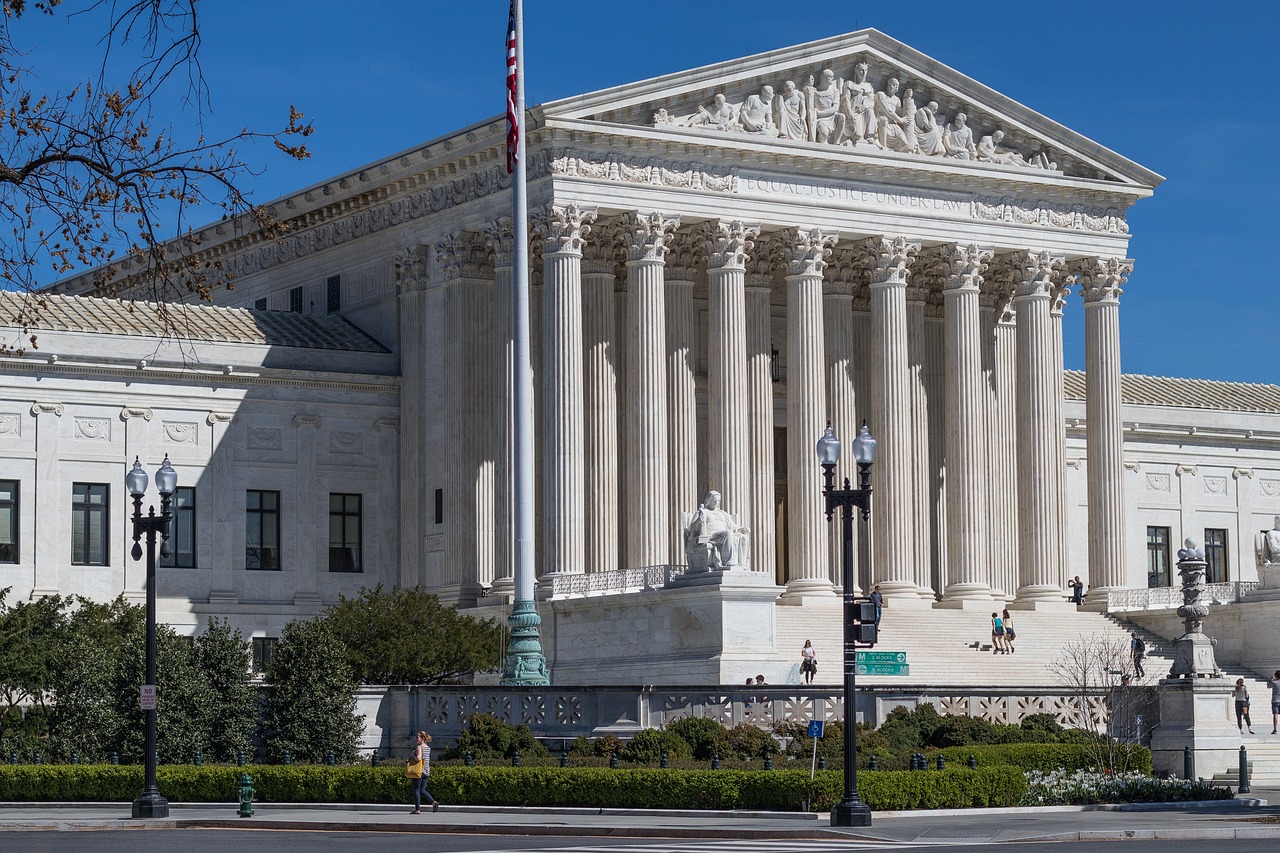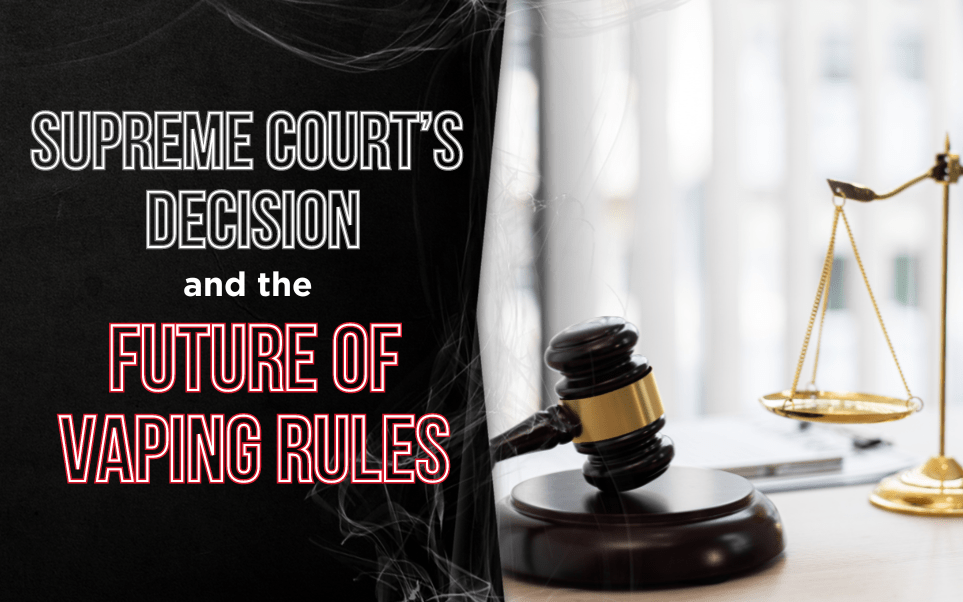Supreme Court's Decision and the Future of Vaping Rules
Estimated 0 min read
A Landmark Ruling: Ending Chevron Deference
The Supreme Court's rulings in Loper Bright Enterprises v. Raimondo and Relentless v. Department of Commerce are pivotal in reviewing federal agency regulations.
The Court has fundamentally changed how courts interact with federal agencies by overturning the longstanding Chevron deference established in Chevron v. Natural Resources Defense Council (1984).
The Chevron deference allowed courts to defer to federal agencies' interpretations of ambiguous laws as long as those interpretations were reasonable. This shift mandates that courts now exercise independent judgment to determine if an agency has acted within its statutory authority without automatically deferring to the agency's expertise.
Implications for the Vaping Industry
The Supreme Court's decision significantly impacts the FDA's regulatory authority over vaping products. The 2016 Deeming Rule, which extended the FDA's jurisdiction to e-cigarettes and other nicotine products not explicitly covered by the 2009 Family Smoking Prevention and Tobacco Control Act (TCA), has been a point of contention.
Under this rule, manufacturers must submit Premarket Tobacco Applications (PMTAs) to market their products. The FDA’s overwhelmed system led to a "fatal flaw" method, issuing widespread marketing denial orders (MDOs) without thorough reviews. With the end of “Chevron deference”, courts may now scrutinize the FDA’s actions more critically, potentially leading to rulings that require the FDA to balance regulatory measures with the benefits to adult consumers and adhere to more transparent processes.
The Current Legal Landscape and Pending Challenges
Several vaping-related petitions are currently pending before the Supreme Court, challenging the FDA’s decisions on PMTAs and MDOs. These cases could clarify the FDA’s regulatory scope post-Chevron deference. The Supreme Court’s willingness to hear these cases suggests potential shifts in regulatory authority and industry practices.
The Court may decide to hear these cases, deny the petitions, or remand them to lower courts for reconsideration under the new judicial standards established by the *Loper Bright* decision. This could set new precedents and reshape the regulatory landscape for the vaping industry in the coming years.
Vape Companies vs. FDA – Challenges
The fight for the right to vape continues as numerous companies challenge the FDA's Marketing Denial Orders (MDOs) in court, striving to protect what they believe is the best tool to help smokers quit tobacco. More than 30 companies, including Triton Distribution, Juul Labs, and R.J. Reynolds, have taken legal action against the FDA, disputing the agency's decisions that they claim are arbitrary and not based on solid scientific evidence.
These companies argue that vaping products are crucial in reducing the harm caused by smoking, offering a safer alternative for millions of smokers seeking to quit. Check out this article here: a constantly updating list of court battles, appeals, and legal actions; Appeals and Legal Actions.
Despite the federal government's efforts to tighten regulations and restrict the marketing of vaping products, the vaping industry remains resilient. The recent Supreme Court's decision to hear the Triton Distribution case marks a significant moment in the ongoing battle.

This case and the end of ‘Chevron deference,’ which previously allowed courts to defer to federal agencies' interpretations of ambiguous laws, could reshape the regulatory landscape for vaping. Legal victories, such as the Fifth Circuit Court's ruling favoring Triton and Vapetasia, highlight the judiciary's growing skepticism towards the FDA's handling of premarket tobacco product applications (PMTAs).
As the legal battles unfold, the vaping industry remains steadfast in its mission to defend its products and ensure their availability to consumers. Companies like Logic Technology Development and Bidi Vapor continue to file petitions, seeking Supreme Court reviews and challenging lower court decisions. The outcome of these cases will have profound implications not only for the companies involved but also for the broader effort to provide smokers with effective tools to quit tobacco. The persistent legal challenges underscore the industry's commitment to fighting for the right to vape and advocating for science-based regulations that acknowledge the potential benefits of vaping as a smoking cessation aid.
Triton Appeal
Take the Triton Appeal, which discusses the Supreme Court's decision to review a lower court ruling that found the FDA acted improperly in denying marketing applications by Triton Distribution, a Texas-based vape manufacturer. This marks the first time the Supreme Court will consider the fairness of the FDA's vaping regulations. The Court's decision, expected in 2025, could significantly impact the future of vaping and nicotine use in the U.S.
The document also highlights the recent Supreme Court ruling that ended Chevron’s deference, which had previously required courts to defer to federal agencies' interpretations of ambiguous laws. This change could affect future legal challenges against the FDA's regulations.
The history of the Triton case is outlined, detailing Triton's initial appeal against the FDA's marketing denial order, the subsequent legal battles, and the Fifth Circuit Court's decision in favor of Triton. The court criticized the FDA's review process, calling it arbitrary and capricious.
Broader Regulatory and Public Health Impacts
Public health advocates have expressed significant concerns over the rise in e-cigarette use among young people. Studies indicate millions of children regularly use e-cigarettes, mainly flavored ones.
The FDA's Premarket Tobacco Product Application (PMTA) pathway requires proof that marketing these products is appropriate for public health. This includes weighing the risks and benefits for the entire population.
The recent actions taken by the Food and Drug Administration (FDA) regarding flavored vaping products have sparked significant controversy and legal disputes. Specifically, the FDA’s denial of many flavored product applications has not gone unnoticed by the manufacturers within the vaping industry.
These manufacturers have taken their grievances to the legal arena, challenging the FDA’s decisions. One of the most notable developments in this ongoing saga is the recent ruling from the 5th US Circuit Court of Appeals. This court ruled against the FDA, firmly criticizing the agency for what it described as unlawfully denying applications from manufacturers. Furthermore, the court pointed out that the FDA was creating unnecessary hurdles not justified by the regulatory framework.
The Court's Criticism of the FDA
The 5th US Circuit Court of Appeals did not hold back in its criticism. It highlighted how the FDA's actions seemed to overstep its regulatory authority. The court argued that by denying applications without adequate justification, the FDA placed arbitrary barriers in manufacturers' paths.
According to the court, this regulatory approach was not in line with the legal standards that govern the FDA’s actions. The court's ruling is a significant blow to the FDA, as it not only overturns its past decisions but also calls into question its overall approach to regulating flavored vaping products.
Implications of the Ruling
This ruling has wide-ranging effects on the FDA, the manufacturers involved in the lawsuit, the vaping industry, and public health policies. It sets a precedent that might impact future regulations and legal challenges, possibly changing how vaping products get approved. The ruling highlights the judiciary's role in balancing regulatory actions with industry interests, ensuring agencies like the FDA stay within their legal limits.
The Biden Administration's Response
In response to this ruling, the Biden administration has been prompted to reevaluate its stance on vaping regulations. The tension between the need to protect public health and the interests of the vaping industry has been brought to the forefront. The administration must now consider how to navigate these complexities. On one hand, there is a clear public health mandate to regulate products that may negatively impact health, especially among young people. On the other hand, an industry argues for its right to operate within a fair legal framework.
The Ongoing Tension
This years-long struggle shows the constant tension between rules to protect public health and the vaping industry's efforts to sell its products. The FDA's job is to keep public health safe, often by strict rules. However, the industry's pushback shows they want these rules to be transparent and fair. As this legal fight continues, it's unclear how it will affect the balance between regulation and industry freedom.
The 5th US Circuit Court of Appeals' recent ruling against the FDA has added another layer of complexity to the ongoing debate over vaping regulations. This case underscores the delicate balance between ensuring public health and allowing industry innovation and marketing. We will likely see further developments in the coming months and years as both sides continue to make their case.
Conclusion
The Supreme Court's decision to end the Chevron deference and investigate the FDA’s overreach into the vaping industry marks a major change in how courts review federal agency rules. This shift could affect the FDA's control over the vaping industry, possibly resulting in more balanced and open regulatory processes.
As the Court prepares to hear several key cases, the outcomes could set new precedents that shape the future of vaping regulation and public health policy. The ongoing debate highlights the need to balance regulatory measures with the benefits to adult consumers, ensuring that future generations are protected from nicotine addiction while maintaining fair industry practices.







